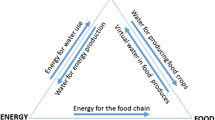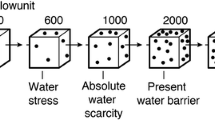Abstract
This paper addresses the economic efficiency of water production and distribution in a vertical supply chain consisting of a water-provider and a consumer (municipality). The inherent conflicts over stocks and supply costs that emerge among the parties in the water supply chain are modeled as a zero-sum stochastic differential game. Consequently, the effects of collaboration and competition are contrasted as well as the application of block pricing and subsidies in overcoming potential conflicts between the water-provider and the municipality subject to political risks of not meeting demands for water. The effect of uncertainty is elaborated as well. In particular, we show that when the supply variance depends on the mean supply, the effect of uncertainty depends on the intensity of the conflict between the municipality and the water-provider.
Similar content being viewed by others
References
Abu Qdais, H. A., & Al Nassay, H. I. (2001). Effect of pricing on water conservation: a case study. Water Policy, 3, 207–214.
Alcamo, J., Henrichs, T., & Rosch, T. (2000). World water in 2025: global modeling and scenario analysis for the World Commission on Water for the 21st Century. Report A0002. Center for Environmental Systems Research, University of Kassel.
Bouwer, H. (2000). Integrated water management: emerging issues and challenges. Agricultural. Water Management, 45, 217–228.
Ettouney, H. M., El-Dessouky, H. T., Faibish, R. S., & Gowin, P. J. (2002). Evaluating the economics of desalination. Chemical Enginering Progress, 32–39.
Feichtinger, G., & Jorgenson, S. (1983). Differential game models in management science. European Journal of Operational Research, 14, 137–155.
Gleick, P. H. (2006). The world’s water: the biennial report on freshwater resources. Pacific Institute for Studies in Development, Environment and Security, Oakland, CA, Island Press.
He, X., Prasad, A., Sethi, S. P., & Gutierrez, G. J. (2007). A survey of Stackelberg differential game models in supply and marketing channels. Journal of Systems Science and Systems Engineering, 16(4), 385–413.
Hakimian, H. (2003). Water scarcity and food imports: an empirical investigation of the ‘virtual water’ hypothesis in the MENA region. Review of Middle East Economics and Finance, 1(1), 71–85.
Kloeden, P. E., & Platen, E. (1999). Numerical solution of stochastic differential equations (3rd edn.). Berlin: Springer.
Kogan, K., & Tapiero, C. S. (2007). Supply chain games: operations management and risk valuation. Boston: Springer.
Loehman, E., & Dinar, A. (1994). Cooperative solution of local externality problems: a case of mechanism design applied to irrigation. Journal of Environmental Economics and Management, 26(3), 235–256.
Martins, R., & Fortunato, A. (2007). Residential water demand under block rates—a Portuguese case study. Water Policy, 9, 217–230.
Martinez-Espineira, R. (2003). Estimating water demand under increasing-block tariffs using aggregate data and proportions of users per block. Environmental & Resource Economics, 26, 5–23.
Olmstead, S. M., Hanemann, W. M., & Stavins, R. N. (2007). Water demand under alternative price structures. Journal of Environmental Economics and Management, 54, 181–198.
Portnov, B. A., & Meir, I. (2007). Urban water consumption in Israel: convergence or divergence? Environmental Science and Policy.
Rogers, P., de Silva, R., & Bhatia, R. (2002). Water is an economic good: How to use prices to promote equity, efficiency, and sustainability. Water Policy, 1.4, 1–17.
Semiat, R. (2000). Desalination: present and future. Water International, 25(1), 54–65.
Shiva, V. (2002). Water wars: privatization, pollution, and profit. Cambridge: South End Press.
Stikker, A. (1998). Water today and tomorrow. Futures, 30(1), 43–62.
Swallow, S. K., & Marin, C. M. (1988). Long run price inflexibility and efficiency loss for municipal water supply. Journal of Environmental Economics and Management, 15(2), 233–247.
USGS survey: 50 years of water-use information (2000). http://water.usgs.gov/watuse/50years.html.
WRI (2001a). Freshwater resources. World Resources Institute, Washington, DC.
WRI (2001b). Per capita water consumption in residential and non-residential sectors. Water Research Institute, Technion, Haifa.
Yaron, D., & Tapiero, C. S. (1980). Operations research in water and agriculture resources. Amsterdam: North-Holland.
Zhou, Y., & Tol, R. S. J. (2005). Evaluating the costs of desalination and water transport. Water Resources Research, 41(3), W03003.
Author information
Authors and Affiliations
Corresponding author
Rights and permissions
About this article
Cite this article
Kogan, K., Tapiero, C.S. Water supply and consumption uncertainty: a conflict-equilibrium. Ann Oper Res 181, 199–217 (2010). https://doi.org/10.1007/s10479-010-0724-z
Published:
Issue Date:
DOI: https://doi.org/10.1007/s10479-010-0724-z




